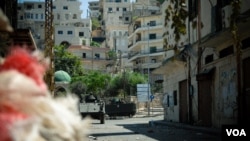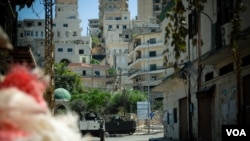TRIPOLI, Lebanon — A sniper's bullet cracks overhead as Abu Ibrahim crouches into his sandbagged fighting position. Seconds later, two gunmen respond with bursts of automatic rifle fire. Between the sniper and Abu Ibrahim's men two Lebanese army armored personnel carriers idle. Then quiet, as a dozen or so fighters emerge from bunkers and doorways nearby to smoke cigarettes and chat. Young boys scurry to pick up empty shell casings.
This is life on Syria Street, a battle-scarred thoroughfare that separates the rival Bab Tabbaneh and Jebel Mohsen neighborhoods in the coastal city of Tripoli, Lebanon's second largest.
At least 16 people have been killed and over 130 injured in clashes that began last week under murky circumstances. Some here have attributed the latest fighting to post-Ramadan fireworks. But whatever the case, it has underscored just how fragile this sectarian tinderbox is and how intertwined these two communities are with Syria.
Even the most innocuous disputes can lead to days of armed clashes, which frequently include small arms, rocket-propelled grenades and mortars. It has also laid bare the inability of the Lebanese government and security forces to restore order.
In many ways, the fighting in Tripoli traces back to the days of Lebanon's 15-year civil war, when Alawites from Jebel Mohsen fought alongside the Syrian army against Sunni fighters of Bab Tabbaneh. The civil war in neighboring Syria has only exacerbated long-running sectarian tensions here, while Bab Tabbaneh has served as a pipeline for weapons flowing to anti-government rebels inside Syria.
On the Jebel Mohsen side, the Alawite chief Rifaat Eid controls a cadre of men loyal to his Arab Democratic Party and, by extension, the Assad regime from which it draws support. In May, Eid called for the Syrian army to return to Tripoli to protect his minority sect, which is estimated to account for roughly 40,000 of the city's 200,000 primarily Sunni residents. Fighters in Bab Tabbaneh answer to a number of local commanders and political parties.
During a lull in the fighting Abu Ibrahim shows off scars on his arms and abdomen that he says are from fighting Syrian soldiers when they occupied Tripoli in 1983. On his forearm is a large, faded tattoo of a sword.
"This has been going on my whole adult life," he says, while blaming Assad for the latest bout of fighting here. "I have nine sons and I won't let any of them fight, but this could change if the situation gets worse. I think it will."
One of Abu Ibrahim's men proudly cradles a new, American-made M4 assault rifle. When asked if the weapon was purchased with money from Saudi Arabia, he nods without expression. There seems to be no shortage of firepower in Bab Tabbaneh, though it is impossible to verify where it all comes from.
Intersections along Syria Street are draped with large canvas and plastic tarps to obstruct the view of snipers from Jebel Mohsen. A vast network of passages – gaping holes blasted through apartment and shop walls – help civilians and fighters circumvent the most dangerous areas.
In Bab Tabbaneh Sheikh Bilal's sitting room is decorated with ornate furniture, bowls of candy and plastic flowers. Stashed around the room in several bags are hundreds of bullets for various handguns and rifles, as well as a new night-vision scope. A small, framed picture of former Prime Minister Rafik Hariri sits on a corner table next to walkie-talkies which buzz steadily with voices and static.
"The dogs from Jebel Mohsen have terrorized us all week," Bilal says. "We will fight them for as long as it takes. Anytime Bashar wants to set Lebanon on fire he can. And this is what he is doing right now."
Sporadic gunfire echoes in the alleyways outside the sheikh's home, which is guarded by his small group of young fighters. There are several escape routes he can use if the incoming fire gets too close.
"Where is all of this money from Saudi Arabia and Qatar that people talk about?" Bilal asks, referring to reports of money being funneled to support Syrian rebels. "We want some of it too, because we need more guns and ammunition to protect ourselves."
Nearby to the sheikh's house a young man named Samir complains, "We have no electricity here. We can't sleep at night because it is so hot and we can't even run fans. And we rarely have running water. This is how the Lebanese government treats its people? They do nothing for us."
Samir is sitting beneath large portraits of Lebanese Prime Minister Najib Mikati and former PM Saad Hariri, two stalwarts of the Sunni community here. The pre-Assad flag of Syria, now the adopted symbol of the revolution next door, flies on almost every block next to portraits of martyrs from the neighborhood.
Through all of the tit-for-tat fighting the men of Bab Tabbaneh seem certain of one thing – that the regime of Bashar al-Assad will fall soon.
"Bashar is finished and Jebel Mohsen knows this," Bilal says. "They are acting out because his time is up."
Several attempts at a ceasefire have ultimately failed and on Sunday, an Alawite official was killed by sniper fire.
In remarks made to a local television station on Sunday, the head of the Tripoli municipality, Nader Ghazal, said, "We have reached the point of no return over the situation in the city."
The Lebanese army has reportedly arrested several gunmen, but the streets remain full of young men brandishing firearms. The sidewalk in front of a food stall now serves as a weapons-cleaning station for the surrounding blocks. The mood is light as men and boys crack jokes about the decrepit state of their Kalashnikovs.
"We are always prepared," one of them says.
Ceasefires come and go almost daily, while the fighters of Bab Tabbaneh brace for the next fight that they are sure is coming.
This is life on Syria Street, a battle-scarred thoroughfare that separates the rival Bab Tabbaneh and Jebel Mohsen neighborhoods in the coastal city of Tripoli, Lebanon's second largest.
At least 16 people have been killed and over 130 injured in clashes that began last week under murky circumstances. Some here have attributed the latest fighting to post-Ramadan fireworks. But whatever the case, it has underscored just how fragile this sectarian tinderbox is and how intertwined these two communities are with Syria.
Even the most innocuous disputes can lead to days of armed clashes, which frequently include small arms, rocket-propelled grenades and mortars. It has also laid bare the inability of the Lebanese government and security forces to restore order.
In many ways, the fighting in Tripoli traces back to the days of Lebanon's 15-year civil war, when Alawites from Jebel Mohsen fought alongside the Syrian army against Sunni fighters of Bab Tabbaneh. The civil war in neighboring Syria has only exacerbated long-running sectarian tensions here, while Bab Tabbaneh has served as a pipeline for weapons flowing to anti-government rebels inside Syria.
On the Jebel Mohsen side, the Alawite chief Rifaat Eid controls a cadre of men loyal to his Arab Democratic Party and, by extension, the Assad regime from which it draws support. In May, Eid called for the Syrian army to return to Tripoli to protect his minority sect, which is estimated to account for roughly 40,000 of the city's 200,000 primarily Sunni residents. Fighters in Bab Tabbaneh answer to a number of local commanders and political parties.
During a lull in the fighting Abu Ibrahim shows off scars on his arms and abdomen that he says are from fighting Syrian soldiers when they occupied Tripoli in 1983. On his forearm is a large, faded tattoo of a sword.
"This has been going on my whole adult life," he says, while blaming Assad for the latest bout of fighting here. "I have nine sons and I won't let any of them fight, but this could change if the situation gets worse. I think it will."
One of Abu Ibrahim's men proudly cradles a new, American-made M4 assault rifle. When asked if the weapon was purchased with money from Saudi Arabia, he nods without expression. There seems to be no shortage of firepower in Bab Tabbaneh, though it is impossible to verify where it all comes from.
Intersections along Syria Street are draped with large canvas and plastic tarps to obstruct the view of snipers from Jebel Mohsen. A vast network of passages – gaping holes blasted through apartment and shop walls – help civilians and fighters circumvent the most dangerous areas.
In Bab Tabbaneh Sheikh Bilal's sitting room is decorated with ornate furniture, bowls of candy and plastic flowers. Stashed around the room in several bags are hundreds of bullets for various handguns and rifles, as well as a new night-vision scope. A small, framed picture of former Prime Minister Rafik Hariri sits on a corner table next to walkie-talkies which buzz steadily with voices and static.
"The dogs from Jebel Mohsen have terrorized us all week," Bilal says. "We will fight them for as long as it takes. Anytime Bashar wants to set Lebanon on fire he can. And this is what he is doing right now."
Sporadic gunfire echoes in the alleyways outside the sheikh's home, which is guarded by his small group of young fighters. There are several escape routes he can use if the incoming fire gets too close.
"Where is all of this money from Saudi Arabia and Qatar that people talk about?" Bilal asks, referring to reports of money being funneled to support Syrian rebels. "We want some of it too, because we need more guns and ammunition to protect ourselves."
Nearby to the sheikh's house a young man named Samir complains, "We have no electricity here. We can't sleep at night because it is so hot and we can't even run fans. And we rarely have running water. This is how the Lebanese government treats its people? They do nothing for us."
Samir is sitting beneath large portraits of Lebanese Prime Minister Najib Mikati and former PM Saad Hariri, two stalwarts of the Sunni community here. The pre-Assad flag of Syria, now the adopted symbol of the revolution next door, flies on almost every block next to portraits of martyrs from the neighborhood.
Through all of the tit-for-tat fighting the men of Bab Tabbaneh seem certain of one thing – that the regime of Bashar al-Assad will fall soon.
"Bashar is finished and Jebel Mohsen knows this," Bilal says. "They are acting out because his time is up."
Several attempts at a ceasefire have ultimately failed and on Sunday, an Alawite official was killed by sniper fire.
In remarks made to a local television station on Sunday, the head of the Tripoli municipality, Nader Ghazal, said, "We have reached the point of no return over the situation in the city."
The Lebanese army has reportedly arrested several gunmen, but the streets remain full of young men brandishing firearms. The sidewalk in front of a food stall now serves as a weapons-cleaning station for the surrounding blocks. The mood is light as men and boys crack jokes about the decrepit state of their Kalashnikovs.
"We are always prepared," one of them says.
Ceasefires come and go almost daily, while the fighters of Bab Tabbaneh brace for the next fight that they are sure is coming.












